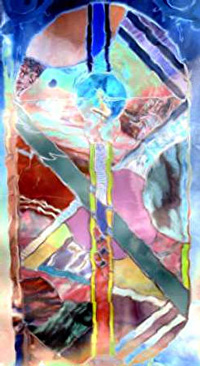
 |
|
When Gardens
Become Cemetaries The little, dead man planted his boyhood marbles in the dry dirt and began to weep. His tears, sliding across the sharp contours of his visage, slithered through the air and slapped the ground. Plumes of dust arose near his feet like tiny mushroom clouds. His wife, who was also dead, stood next to him. "Phil," she said. "This marble is prettiest." And she handed him a blue-green marble flecked with gold. "It looks like the ocean during a sunset," she explained. Phil held the thing in his skeleton fingers and pressed it against the sky. There wasn't that much light these days, but enough got into it to help him remember. "Exactly," he choked. "Do you remember that dream?" she asked. "Parts of it," he said. "But it was so long ago." They held each other on that dry land . . . cried into each other's shoulders. Tears rolled off of them like golden lava, but it was never enough. "Are you going to put it in the ground with the others?" she asked. "I suppose," said Phil, releasing his wife and examining the marble. He rested it in the palm of his hand and rolled it around gently; swirls of white glass and the eternal weave of green and blue and golden flecks of the sun. It was as if nothing in there could ever die. But it was also an illusion, contained within the minds of all dead gods. It was a thing never to be trusted. Phil swirled it around and around in his palm until he discovered the flaw. Of course, he knew it would be there. It was nearly indiscernible, but when looked at closely enough. "You see that," he said, pointing a dead finger into the flawed marble. Phil's wife settled her eye against the glass orb and felt her heart searching. It was not something she wanted to see, but couldn't help from looking anyway. "It's sad, isn't it?" she said. "It is the saddest thing in the universe." And there, tiny, tiny, beneath swirls of white and the eternal weave of blue and green, yet in a place where golden flecks of sun could not reach, there rested the charred remains of a child. "Was it an angel?" she asked. "I was an angel," he said. "You were a god." "But first I was an angel." "Then I was an angel, too," she said. "You still are." And he kissed one of her skeleton cheeks. "What happened to it?" she asked. "They tortured it until there was nothing left for it to do but die." Phil's wife slumped to her knees, held her head skull in her hands, and moaned. "Give it to me," she said. Phil handed her the marble. How many worlds had he created? How many life forms had he breathed life into? And now, how many had he destroyed? "I'm not a boy anymore and I can't go on like this." "It may not be perfect," she said, "but it's close." "Does that count?" "I suppose it does," she said. "He was my son," he explained. "Then he was my son, too." "Do you remember?" he asked. "Do you remember how he used to smile?" She had the marble against her eye once more. She was trying to decide if she remembered anything about him. He was tiny in there, and defeated; a minor flaw in what might have been perfection. Did he screw it up? She wondered. Or did he add to the beauty of the thing? "Bury it," said Phil. "Like the rest. All of my memories. All of my creations. Bury them all." And he brought out two great handfuls of marbles from his shabby pockets. "It's getting dark," he said. "And it will only get darker." |
 |